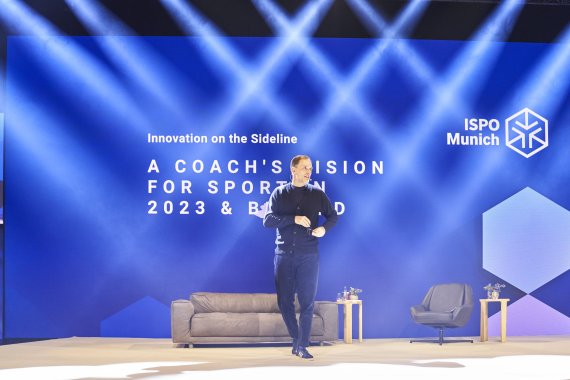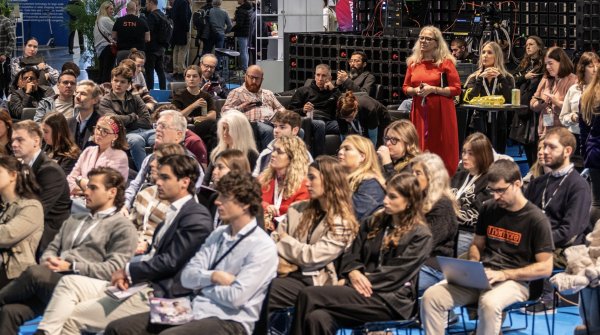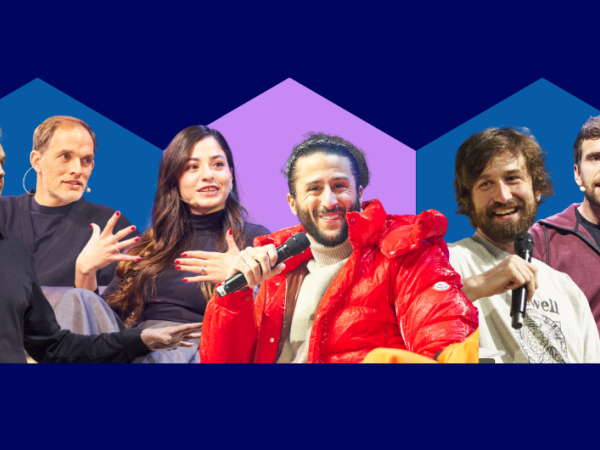Everyone has something inside them that they can do better than others. Thomas Tuchel's special talent: the the successful soccer coach finds it easy to "quickly analyze complex situations in a soccer match and always think ahead and in a solution-oriented way, whether on the soccer pitch or in his private life." A very special gift, but the coach put it in a nutshell: "Everyone has to find their own way. "
The key to achieving this? Having dreams and listening to your gut feeling. Tuchel used the example of his players to show us just how important gut instinct and intuition are. Especially in pressure situations during a match, where quick solutions and decisions have to be made, intuition is the be-all and end-all. But intuition should also be given more leeway outside of soccer. "If someone has this feeling, they should stick with it and trust their gut instinct that this is the right feeling. And once you've taken this path, you can achieve a lot." The big challenge is then usually to trust your gut feeling, because your head usually switches on at the same time as your instinct, explained the coach.
Vanlifer Foster Huntington introduced the audience to another approach of listening to his intuition. When he has a new idea, he asks a very special person what they think of it: "With all the projects I work on, I ask myself: would my inner child think this is a cool project?" In other words, you find your own path by listening to yourself with mindfulness, giving space to your own desires and goals and pursuing the things that really define you. So, moving away from "Well, that's what other people do" to "Oh, my inner child would like that".
One person who certainly listens to her inner child is Yusra Mardini. Even at the age of 9, the current UNHCR ambassador of becoming part of the Olympic Games - and in 2016 she fulfilled her dream as part of the Refugee Team. Resting now? Definitely not, because dreams are always evolving or new ones are added, Mardini explained to us. Like that of her own foundation: the Yusra Mardini Foundation focuses on supporting refugees around the world in the areas of education and sport.

Anyone who pursues dreams is bound to come up against their own limits sooner or later. Even the megastars face fears and obstacles. Be it Jonas Deichmann, who faces wild animals or exceptional political situations on his adventures, Foster Huntington, who struggled with dyslexia for a long time, Yusra Mardini, who had to flee the war in her home country, or Colin Kaepernick, who sacrificed his football career for his activism.
The magic word is resilience! "Nobody has achieved anything in life or sport without suffering failures that build us up," said basketball coach Gordon Herbert. He explained that you have three options when faced with resistance.
- Firstly, to do nothing.
- Secondly, to look out of the window, apologize or blame others.
- And thirdly, to look in the mirror, take responsibility and draw up a plan to improve.
Colin Kaepernick also appealed to the audience:
As important as he considers the resilience factor to be for success, he also emphasized how difficult it is to put this into practice. It requires discipline, consistency, networking, organization and community. But resilience pays off, especially in the case of Kaepernick's activist goals: "All of these things benefit millions of people."
We learned a very special technique for keeping going on his impressive adventures from Jonas Deichmann: "There's a playlist that helps me keep going when the running gets exhausting and tiring, and that's the Forrest Gump soundtrack."
Coaches Gordon Herbert and Thomas Tuchel know this. They don't just have to push their own boundaries and surpass themselves. They also have to teach their teams to do the same. Particularly in the event of defeats, the coaches and their teams not only have to deal with the negative feeling of not having lived up to their own standards, but also with fierce opposition from the press, society and fans.
Tuchel and Herbert's philosophy: no social media, no press. The FC Bayern coach (2023/24 season) explained that his mindset and that of the players (and certainly that of many others) can be negatively influenced by social media. Out of 100 comments, the two bad ones are automatically filtered out and taken to heart. Tuchel revealed: "I've taught myself to stay away from the internet and not to read about myself. I taught myself not to compare myself to others." Gordon Herbert, who neither reads a newspaper nor uses social media, echoed the same sentiment.
And what if you get to a point where you don't know what to do? Thomas Tuchel gives an insight into his methods: a round of meditation, breathwork, exercise, going for a run. The main thing is to let the negative feelings out and let go.
And then: move on!

Moving forward works particularly well with the right team. Thomas Tuchel, for example, has had to overcome numerous hurdles with his teams. Be it the coronavirus pandemic during his time in Paris or the war in Ukraine when he was coaching at Chelsea. How did they get through these crises? As a team. The stronger a team is, the stronger the team spirit, the easier it is to give each other strength, overcome crises and rise above them all together.
The recipe for a good team? Gordon Herbert revealed it: team building. And not just in times of crisis, but right from the start. Herbert gave a comprehensive insight into the team-building measures of the German national basketball team. From camping, hiking and climbing to bowling and darts, everything is included. Where does that lead? "The team members communicate, they support each other, they discuss, they help each other. That's the whole idea."
Team spirit is also a top priority for Tuchel. To this end, he and his team also tackle the topic of mindfulness. Be it through meditation, yoga, Pilates or deep relaxation - the soccer coach made it clear that mindfulness does not end on the yoga mat. Mindfulness leads to the team treating each other with respect and everyone involved in the success, from the chef to the bus driver. "You can be mindful together, you can be respectful together. We may need an aggressive team on the outside, but internally, respect, friendliness and democracy are paramount."
The two coaches also believe in another ingredient for a good team: the I(ch) in Team. "I believe there is an I in team," explained Gordon Herbert and Thomas Tuchel confirmed this in his interview the following day. While fans used to be supporters of clubs, they are now often fans of specific players, which automatically means that players are now more ego-centric. Tuchel explained that this is not fundamentally a bad thing: "Many players have personal nutritionists and their own therapists, they can work on themselves individually and thus contribute even better to the team's success." Everyone struggles with their own individual challenges and so it is also important in a team to get the best out of each individual, the basketball coach also emphasized. Tuchel illustrates this with the example of superstars in the spotlight and the "silent superstars". The silent stars are essential, as they are role models who bring values to the team, lead and motivate the team. However, the superstars in the spotlight must also integrate themselves into the team and appreciate the others, "only then will the team be prepared to give them the stage they need."
Team spirit as a success factor in team sport? Okay, this statement comes as little surprise. Gordon Herbert used the example of the Ryder Cup to illustrate what an outstanding team can achieve: although golf is an individual sport and the individual players from the USA are significantly stronger, Europe has won 9 of the last 12 Ryder Cups. Because they are the better team.

Our speakers agree on another point when it comes to the recipe for their successful life stories. Although they are all role models and idols themselves, they also have people who inspire and motivate them. Who do the superstars look up to?
Colin Kaepernick looks up to Malcom X. "[He] has changed my way of thinking a lot and influenced my view of the world and the opportunities it offers." Not least because of his resilience.
Gordon Herbert also knows and lives by the fact that you can learn from others. He makes it clear how important it is to surround yourself with people who broaden your horizons. The world champion coach, for example, loves to surround himself with creative people who look beyond their own horizons, because he rarely does that himself.
And for Thomas Tuchel? Anyone and everyone can be an inspiration for him - be it be it Gordon Herbert, the people he works with, a teacher at his daughters' school or a stranger out for a walk. Because everyone has stories, experiences and opinions that you can learn from if you are open to them. His players in particular inspire him:
And sometimes, you don't need a role model or inspiration, you just need direct motivation, support and cohesion, as Yusra Mardini shows. "Sometimes it's important to have someone in the room who believes in you more than you do."
And what happens when we set out to live our dreams, when we stick together, support each other, grow together and no resistance holds us back? Then we can not only write our own success story, but also change the world.
And we should, as Colin Kaepernick made clear at ISPO Munich 2023: "You can be the best in the world at something, but you also have to deal with the reality of society and not disconnect from it." Yusra Mardini also showed how valuable a single person can be for a community. She talked about what a special moment it was for her to realize that her participation in the Olympics not only fulfilled her own personal dream, but was also important for millions of refugees around the world.
Both appealed above all to athletes to use their platform and have an impact on society. Kaepernick made it clear that more and more athletes have found their voice in recent years and hopes that this will continue to increase. Especially by reminding themselves that they "have control over their destiny and are not just subject to what an organization or institution wants."
Both also agree that it takes time to find the right mindset and the courage to change the world, but Mardini appealed: "They are courageous while playing their sport". Now is the time to use this courage for a better future.
Whether it's our own history, the history of society or the history of the sporting world: let's write it.
 MunichLast Week at ISPO
MunichLast Week at ISPO MunichRetail Conference
MunichRetail Conference
- ISPO awards
- Mountain sports
- Bike
- Design
- Retail
- Fitness
- Health
- ISPO Job Market
- ISPO Munich
- ISPO Shanghai
- Running
- Brands
- Sustainability
- Olympia
- OutDoor
- Promotion
- Sports Business
- ISPO Textrends
- Triathlon
- Water sports
- Winter sports
- eSports
- SportsTech
- OutDoor by ISPO
- Heroes
- Transformation
- Sport Fashion
- Urban Culture
- Challenges of a CEO
- Trade fairs
- Sports
- Find the Balance
- Product reviews
- Newsletter Exclusive Area
- Magazine


